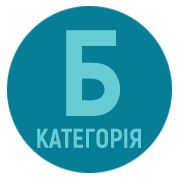PECULIARITIES OF PROFESSIONAL TRAINING OF FUTURE FOREIGN LANGUAGE TEACHERS FOR WORK IN INCLUSIVE CLASSROOMS
DOI:
https://doi.org/10.32782/2307-1222.2023-56-8Keywords:
differentiated approach, inclusive education, inclusive competence, inclusive class, categories of studentsAbstract
The reform of education in Ukraine has revealed a problem that the general public tried not to mention: the adaptation of children with physical disabilities to society. In the pre-reform period, there was no question of their studying in a general secondary education institution with their peers. Persons with disabilities were offered placement in specialised boarding schools, where they felt isolated from society. Instead, in international practice, there was a system of education for such children in general secondary education institutions, the so-called inclusion. While the issue of tolerance towards children with disabilities on the part of students was resolved fairly quickly, the problem of organising the work of teachers in inclusive classes proved to be much more difficult. Many teachers, including foreign language teachers, were not ready to work in such classes. The article “Features of professional training of future foreign language teachers for work in inclusive classrooms” explores the issue of preparing foreign language teachers to work with students with special needs in inclusive classrooms. The article considers the theoretical aspect of developing skills and abilities of foreign language teachers, considering the needs of students with various developmental characteristics. The author of the study highlights the main approaches and teaching methods that can be applied to work with such students. The article also discusses the issue of organizing a differentiated approach to foreign language teaching, considering the individual needs of each student. The author concludes that foreign language teachers should have not only knowledge of the language, but also knowledge and skills in working with students with special needs, which allows for creating a comfortable and effective learning environment for all students. This article may be useful for foreign language teachers, future teachers, and anyone interested in the issue of inclusive education and teacher preparation.
References
Філіпчук Г.Г. Національна освіта: особистість і суспільство. Збірник наукових праць. Чернівці : Зелена Буковина, 2013. 710 с.
Колупаєва А.А. Інклюзивна освіта як модель соціального устрою. Особлива дитина: навчання і виховання. 2014. № 2 (70). С. 7–18.
Енциклопедія освіти. Акад. пед. наук України. / гол. ред. В.Г. Кремень. Київ : Юрінком Інтер, 2008. 1040 с.
Кучерявий О.Г. Педагогіка: особистісно-розвивальні аспекти : навчальний посібник для студентів вищих навчальних закладів. Київ : Слово, 2014. 94 с.
Ягупов В.В. Педагогіка : навчальний посібник. Київ : Либідь, 2002. 294 с.










